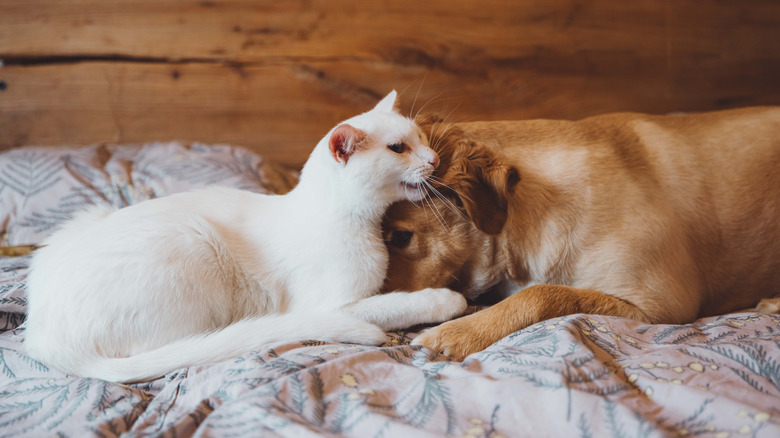If You Let Your Pet Sleep With You At Night, You Likely Have These Psychological Traits
Cuddling up with a purring cat or a little furnace heater of a dog can be the highlight of some pet parents' nighttime routines. This makes for a wonderful bonding experience where pets can also help their owners rest better. Yet, if you dig a bit deeper, welcoming a furry friend into the bed at night says a lot about the type of person an owner is and their potential psychological traits.
Speaking exclusively with Cuteness, New York City-based neuropsychologist Dr. Sanam Hafeez, director of Comprehend the Mind, shed some light on the psychological traits of those who let their pets sleep with them. When it comes to welcoming an adorable bed buddy, Dr. Hafeez notes, "This behavior demonstrates a fundamental level of compassion and emotional warmth toward another living being, as these individuals seek closeness and willingly provide comfort and safety." adding "People who share their beds with pets demonstrate high emotional intimacy and gain reassurance through physical closeness, which shows their ability to form strong attachments."
Letting a curious kitty or a dog in bed with you may seem like a natural gesture to some pet parents, but as Dr. Hafeez points out, "The behavior appears basic, yet reveals a person who seeks connection, demonstrating a generous heart that opens up even during nighttime hours." Some pet owners may rethink whether they should let their cat or dog sleep with them, knowing it highlights positive character traits, but there are shortcomings and valid reasons why people don't want a bedtime buddy.
When letting a pet sleep with you at night doesn't work
While the initial action of allowing a furry friend to curl up in bed is not in itself harmful, Dr. Sanam Hafeez explains how these bonds can sometimes be hiding bigger problems. "People sometimes use their pets to fill emotional voids," she exclusively tells Cuteness, adding, "Using a pet as a replacement for human relationships or to evade emotional distress could suggest a need for professional therapeutic evaluation."
Many pet parents report better sleep with a companion beside them, but this is not a universal sentiment. As Dr. Hafeez notes, "Poor sleep quality over time can also exacerbate mood disorders, irritability, or cognitive fog, leading to a subtle but real toll on mental health." Pets can affect poor sleep quality in numerous ways, whether it be a constantly moving dog that snores and slobbers, or a cat who decides it's playtime in the middle of the night. Owners with allergies may also want to keep their beds free of dander and hair. For some, concerns of diseases or pests like fleas, ticks, or mites making their way into the bedroom are enough to deter having a pet join them at night.
Welcoming a dog or cat into the bed at night reflects positive psychological traits as long as owners are aware if they are becoming too dependent on the comfort. At the same time, choosing to sleep alone with valid reasons does not mean an owner is not compassionate. Sharing a bed with a pet can be a great chance to bond, but even if that does not work out, there are plenty of ways to show a kitty or pup affection throughout the day.
If you live with a mental illness and may benefit from an emotional support animal, speak with a licensed mental health professional to discuss incorporating an ESA into your treatment plan. For mental health resources, please contact the Crisis Text Line by texting HOME to 741741, call the National Alliance on Mental Illness helpline at 1-800-950-NAMI (6264), or visit the National Institute of Mental Health website.

